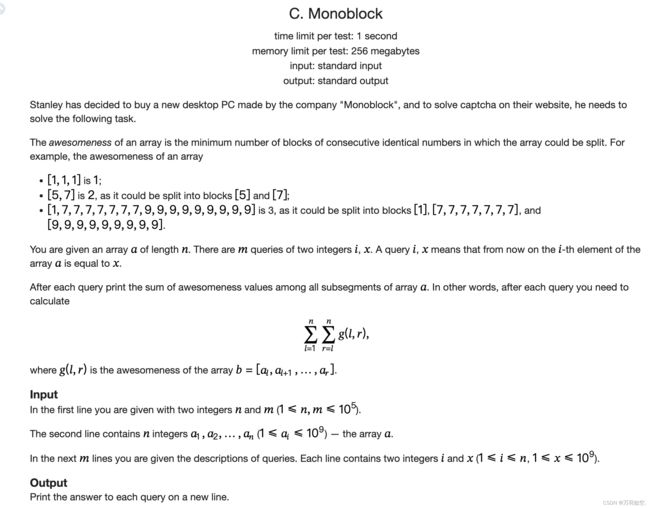Codeforces Round #816 (Div. 2) C. Monoblock
翻译:
Stanley决定购买一台由monblock公司生产的新的台式电脑,为了解决他们网站上的验证码问题,他需要解决以下任务。
数组的神奇之处在于数组可以被分割的连续相同数字块的最小数量。例如,数组的强大
[1,1,1]为1;
[5,7]为2,可分为[5]和[7]块;
[1、7、7、7、7、7、7、7、9,9日,9日,9日,9日,9日,9日9,9]是3,因为它可以分成块[1],[7、7、7、7、7、7、7],和[9 9 9,9日,9日,9日,9日9,9]。
给出一个长度为的数组。对两个整数、有查询。查询,意味着从现在开始数组的-th元素等于。
在每次查询之后,打印数组的所有子段之间的awesome值的总和。换句话说,在每个查询之后都需要进行计算
∑= 1∑=(),
()数组的精彩=[,+ 1,…,]。
输入
第一行给出了两个整数和(1≤,≤105)。
第二行包含整数12,…,(1≤≤109)——数组。
在接下来的行中,将给出查询的描述。每行包含两个整数和(1≤≤,1≤≤109)。
输出
在新一行打印每个查询的答案。
例子
inputCopy
5个5
1 2 3 4 5
3 - 2
4个2
3个1
2 1
2 - 2
outputCopy
29
23
35
25
35
请注意
在第一个查询等于[1,2,2,4,5]之后,答案是29,因为我们可以按以下方式分割每个子段:
[1;1]:[1], 1块;
[1;2]:[1]+[2], 2块;
[1;3]:[1]+[2,2], 2块;
[1;4]:[1]+[2,2]+[4], 3块;
[1;5]:[1]+[2,2]+[4]+[5], 4块;
[2;2]:[2], 1块;
[2;3]:[2,2], 1块;
[2;4]:[2,2]+[4], 2块;
[2;5]:[2,2]+[4]+[5], 3块;
[3;3]:[2], 1块;
[3;4]:[2]+[4], 2块;
[3;5]:[2]+[4]+[5], 3块;
[4;4]: [4], 1 block;
[4;5]:[4]+[5], 2块;
[5;5]:[5], 1块;
这是1 + 2 + 2 + 3 + 4 + 1 + 1 + 2 + 3 + 1 + 2 + 3 + 1 + 2 + 1 = 29。
题意:根据题意来给的公式不断计算,然后每次单点修改,再次查询。
思路:我们来将数组倒着看,每个相邻不同的对于总贡献是前一个的贡献加上这个数的下标,然后不同的则是前一个的贡献+1,然后可以推出值的改变对总贡献的影响,(i-1)*(n-i+1),然后对于四种情况来进行判断,可能说的不太明白,具体的可以看代码。
代码:
#include
#include
#include
#include
#include
#include
#include
#include
#include
#include 
